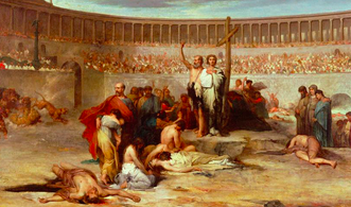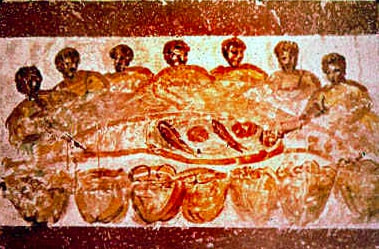 After 35+ years reading the Bible, knowing Greek fairly well so I able to read and interact with the New Testament Greek text, having memorized and studied much of the NT (for personal, ministry, and academia), and doing my best to listen to the text (I am an exegete foremost) as well as I can, getting past as much as possible the cultural, institutional, and Christendom lenses that cause me to be socially safe, institutionally protective, and (I know some hate when this is pointed out) Western, I have come to understand that we might not have the capacity to fully grasp how culturally, socially, and institutionally subversive the gospel (itself) and the writings of the New Testament truly are. Sorry for the long sentence. But, I am becoming more and more undone by the New Testament each time I approach it. I am laid bare before the Word. I am floored now to think of what, say, the apostle Paul went through to convince and demonstrate love for those in a polytheistic culture, whose understanding of what “others” (non or lesser) human beings were, and a civilization of people who were so far removed from the meaning of Jesus’ death on that cross. Multiple imprisonments. Countless beatings. I can’t even imagine the forty lashes he endured on a number of occasions—for the sake of the gospel and the sinful, corrupt, ignorant, racist, dehumanizing . . . the unaware. The stoning and being left for dead. Never to walk or stand the same again—ever. Shipwrecked. And set afloat on the wreckage for days. Sleeping on the roadside. Wondering if robbers were about. When sleep was even possible. Hunger. Thirst. Exposure. All for the love of Christ and those needing the gospel (2 Corinthians 6, 11, 12). I cannot imagine this in my safe, Christianized world. I am now unsure whether we, whether I, frankly, follow in these footsteps as we should be (“Brothers, join in imitating me, and keep your eyes on those who walk according to the example you have in us,” Phil 3:17). I fear we have more so become, as Paul told us with tears, “enemies of the cross of Christ” (Phil 3:18), whose “god is their belly, and they glory in their shame, with minds set on earthly things” (v. 19). I wonder if we, if I, truly believe that “our citizenship is in heaven," and whether we truly “await a Savior, the Lord Jesus Christ, who will transform our lowly body to be like his glorious body, by the power that enables him even to subject all things to himself” (vv. 20-21). I think I'd live so very differently, if I truly believed this. I am now so amazed--aghast, is really the word—that we have so succumbed to the ways we do things as church in the western march of Christendom that we cannot fathom church any other way than how we experience church now. I am equally aghast at my own shallow level of understanding the gospel that leaves me safe and privileged. I am undone at my own inability to fathom what Jesus meant when he commanded that we “love one another.” I am humbled to think I have not made the link that Paul made from the cross, the death of Jesus, to the reconciliation implied by the power of the blood (Ephesians 2:11-22). I am so protected from the subversiveness of the gospel and rest way too easily in knowing I have my ticket to heaven. I have a safe Christianity. A safe discipleship. A safe gospel. And, a safe ecclesiology (i.e., a safe church).
At nearly 60, I am re-learning (maybe re-hearing and listening better is a better way of saying it) what Paul wrote to the church at Philippi while in chains for the gospel in some jail cell: “But whatever gain I had, I counted as loss for the sake of Christ. Indeed, I count everything as loss because of the surpassing worth of knowing Christ Jesus my Lord. For his sake I have suffered the loss of all things and count them as rubbish, in order that I may gain Christ and be found in him, not having a righteousness of my own that comes from the law, but that which comes through faith in Christ, the righteousness from God that depends on faith—that I may know him and the power of his resurrection, and may share his sufferings, becoming like him in his death, that by any means possible I may attain the resurrection from the dead.
At the dawning of my 60th year, I hear again Paul. So easy to forget what lies behind when what lies ahead is basically more of the same that has kept me safe, Christianized, and somewhat well fed and sheltered. Altogether different in a jail cell for the real gospel that compelled him to strain forward to what lies ahead--more jail cells, beatings, and death for those who need the gospel. “Not that I have already obtained this or am already perfect, but I press on to make it my own, because Christ Jesus has made me his own. Brothers, I do not consider that I have made it my own. But one thing I do: forgetting what lies behind and straining forward to what lies ahead, I press on toward the goal for the prize of the upward call of God in Christ Jesus. Let those of us who are mature think this way, and if in anything you think otherwise, God will reveal that also to you (Philippians 3:4-11). This is what I am thinking, praying . . . I know what needs to be forgotten . . . wondering what lies ahead.
1 Comment
Confronting slavery and oppression: A more ambitious proposal by Paul, Jesus, and the NT writers8/4/2017  I am developing a paper (for later this year and as a chapter in a book on Christians responds to tyranny and oppression), of which a part is related to the issue of slavery and how the gospels and Paul addressed the issue. This following thought from my research and draft (so far) was affirmed by a book review on the issue of slavery that I recently read (I haven't read the book yet)—one of my initial conclusions: despite our desire that Jesus, Paul, and other NT writers would have simply announced the evil of slavery (which they did not, at least in a clear way we modern, progressive Americans could appreciate), we need to understand that Jesus et al. were after something higher, more significant. Wisdom, I believe, had actually prevailed in their approach.  Rather than an exchange of power(s) and enforcement by power (which always means some level of violence to human beings), Paul and Jesus (and Luke in Acts for that matter) had something for more ambitious in mind than advocating that slaves to be legally free (which would have been good for our comfort levels and political agendas, but actually not so much at that time for slaves). Paul and Jesus wanted the church to see slaves as human beings. In essence, NT writers make us see and recognize slaves and other marginalized people as human beings. This, along with making children and women into human beings (which they all had always been, but you know what I mean), is what changed everything, unhinged an empire, and, as a result, the gospel-cross-shadow (this approach and paradigm modeled by Jesus and the NT writers) through household churches, then, caste itself the gospel moved demographically and geographically into the Gentile world, especially into the Roman Empire. This should be what the church is about: declaring, making, advocating, accepting, welcoming others, especially the marginal, the oppressed, and disenfranchised into and as human beings. This is what the early church’s Holy Kiss, household baptisms, open tables (i.e., the banquet-meal and Lord’s Supper), and the horizontal nature of Christian gatherings did, subverting oppression and slavery that had been stamped and framed by an Empire built to affirm vertical social status and religious and civil power.
|
AuthorChip M. Anderson, advocate for biblical social action; pastor of an urban church plant in the Hill neighborhood of New Haven, CT; husband, father, author, former Greek & NT professor; and, 19 years involved with social action. Archives
February 2024
Categories
All
|
Pages |
More Pages |
|
 RSS Feed
RSS Feed